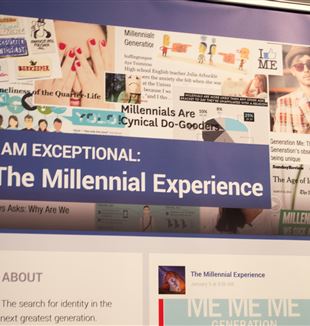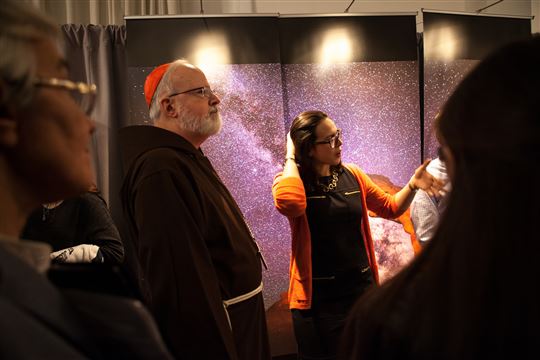
The Millennial Experience
Over the past year, Jonathan Ghaly and 80 other young adults across the US created an exhibit on the experience of the “Millennial.” We publish an interview with Ghaly in which he discusses the process behind the Millennial exhibit.Jonathan Ghaly was born and raised in southern California. At the age of 18, after becoming friends with another young Catholic, he had a profound Christian encounter and began to live his faith more seriously. He went on to graduate from Franciscan University of Steubenville in Ohio with a degree in Humanities and Catholic Culture, Philosophy, and Theology. Afterwards, he taught high school for two years in Illinois where he met the lay movement Communion and Liberation. He now lives in Denver, CO and works as a realtor and real estate investor. Over the past year Jonathan and 80 other young people from across the United States have worked together to produce an exhibit on the experience of the “Millennial” generation which will be presented for the first time this weekend at the New York Encounter.
Hi Jonathan, thanks for sitting down with TracesOnline as you get ready to join us here in Manhattan for the 2015 New York Encounter. This year the NYE promises to be full of the usual depth, beauty, and wonder that have marked past Encounters. I know that you and some friends spent a lot of time working on one of the Exhibits at the Encounter on the “Millennial Experience.” Can you tell us what a millennial is and why is this so important for the New York Encounter?
JG: Well, typically a millennial is anyone born after Generation X, between the early 1980’s and the early 2000’s, but there’s a wide range in how “Millennials” are perceived. On the one hand the media often portrays us as narcissistic, phone-addicted, selfie-loving, entitled, lazy young people going through a quarter-life identity crisis with a deep need for constant affirmation via our social media platforms. While much of this may be true, we wanted to go a bit deeper and ask ourselves, “What is the core of this experience of being a Millennial?” What we found, after several months of conversation, study, and working together was this core belief that “I am exceptional,”—this became the title of our exhibit—and a general feeling of discontent in our generation with the old formula of “Go to a good college and you’ll get a good job and get married and make good money and be happy.” This general discontent and wanting something more which is felt among so many young people along with the constant search for what makes me exceptional as an individual is in the end the problem of every person, I think, no matter what age.
So then, can you give us a foretaste of what we can expect from the exhibit, when we see it live?
JG: Well I don’t want to spoil it, it’s really something to be experienced, but I can say it will be truly “millennial.” There will be “selfie” stations, videos, lots of social media integration, banners, and a moment for the audience to contribute something themselves. It’s really cool! There’s more but I just can’t give it all away. You’re going to have to see it. Who knows, even Taylor Swift might be there.
What about you and your friends, what has surprised you working on this project? Did you face any challenges? How did it all come together?
JG: The most surprising and beautiful thing was the transformation that many of us experienced that went from seeing this as a “project” were doing to becoming something that was “for me,” for us. At first, a lot of us were focused on trying to create this big thing, dividing up the tasks, etc. But Fr. Jose Medina (National leader of Communion and Liberation) kept proposing that instead we do a work on ourselves first, to see what we could discover about ourselves. I mean, you hear about a project like this and you’re already trying to figure out in your head how to make it a “success,” whatever you think that means. But you so easily skip over yourself, cut yourself from the “project,” then nothing in you really changes. This, in the end, is a real failure. Instead, we decided to follow Fr. Jose’s proposal and our group had tons of Google Hangouts where we never even talked about the project, but instead we began to become aware of and face these pressing things in our lives, like the difficulties in our relationships, struggles with feeling free, our needs and desires, and the ways we reduce the big questions of meaning and fulfillment in our lives (and thereby reduce ourselves in the process), living as if our human worth comes from the things we do not something infinite… I could go on and on, but instead it was so beautiful how these really vulnerable conversations with each other–and some of us didn’t even know each other that well–turned into real friendships where we started emailing, texting, and calling each other, wanting to stay together. This was the evident change in our group, which was miraculous. It was like the more we worked together, the more we were able to face these questions in our lives. This was the greatest “success” of the exhibit. And then, when it came time to actually make the exhibit, a few of us really stayed together and gave a ton of time and effort to it. But it wasn’t because “Oh great, we’re obliged to finish this now,” but rather, “All this work is totally for me, it really helps me face my own life.” Of course there were tons of challenges and infinite problems in getting the actual thing done, but the determination of a few helped us get everything done by the skin of our teeth, just in time, Millennial-style.
Millennials are the generation of gay marriage, Facebook, President Obama, the smart phone, and Ferguson. Without a doubt, you have all experienced rapid social change coupled with the capacity to share your personal experience of everything with people across the world instantly. This makes you unique but at the same time offers you great possibilities. Still, some would argue that your generation remains adrift and unfocused. What do you think are the greatest gifts and challenges facing Millennials as they begin to take serious responsibilities in the world?
JG: I think the greatest gifts that Millennials have includes our discontent with the old formulas of money and success (that didn’t work for the Baby-Boomers mind you) and our desire for “something more,” a real search for identity, meaningful work, and authentic fulfillment. I just saw an infographic that shows that Millennials place far greater value on happiness and discovery than Baby Boomers do, and would rather have meaningful jobs they love that pay $40k a year instead of having a job they don’t like that pays $100k. I think this is a huge generational shift. We don’t want to allow money or a some archaic blueprint of the American dream to determine our lives. We really want to find meaning. One of my friends, a young mom in our group, told us that she was with a group of much older mothers and when she brought up her struggle of staying at home with her kids the much older mothers looked at her like she was an alien, they were uncomfortable with her sharing what seemed like dissatisfaction with being a mom. But, I think that vulnerability and discontent can be a path to something deeper instead of the “Everything is ok!” kind of fake thing.
And, the challenges?
JG: I would say that a couple of big challenges facing us Millennials are that although we perceive our great exceptionality, we either don’t know why, or we think we earn this exceptionality by our cool accomplishments or by getting lots of “likes” on social media, or by making some kind of change in the social order. But deep down we know this isn’t adequate, it doesn’t actually fulfill us, and so we’re liable to make the same mistakes the previous generations have made in ignoring the authentic answers to the big questions of meaning, self-worth, and identity and instead just trying to live a comfortable life. Because we’re so passionate, we also have a tendency to just react superficially to everything, to jump on a lot of bandwagons in the name of “change” and “meaning” and then walk away from things out of disillusionment, but not really ask ourselves if our hearts we were truly fulfilled or not, regardless of the cool things we did. There’s a tendency to blame everything on everyone else–the government, our parents, even the Church–but pointing fingers still leaves us with an inadequate answer. The most adequate thing we’ve experienced is the miracle of a personal encounter with Christ that makes all of life a promise and a relationship for myself personally, which changes me, no matter what society is doing or not doing.
When speaking to a group of bishops recently, Pope Francis said, “The young person is essentially a non-conformist, and this is very beautiful. It is necessary to listen to young people…” What do you think that this Millennial non-conformity offers the Church, and what should the Church be listening to in the Millennials?
JG: Again, it’s this vulnerable discontent. It is the authenticity that comes from ripping off all of our masks of fakeness and self-delusion and just being honest, facing the disproportion inherent in our hearts. Just because the Church has answers, doesn’t mean that we always experience those answers. It’s not enough to have a good orthodox homily anymore or beautiful liturgies or “cool” music at Mass or even a “young adult group.” Millennials are too honest for anything that falls short of an authentic encounter. We need to experience the Church as a companionship to our whole life, a companionship in which we experience the satisfaction of Jesus of Nazareth, the one who answers all of our need. If this isn’t a lived experience, something we can touch, be friends with, then everything is meaningless words, rituals, and, in the end, truly boring. Thankfully, Pope Francis is on the same page. I love that guy.#NewYorkEncounter